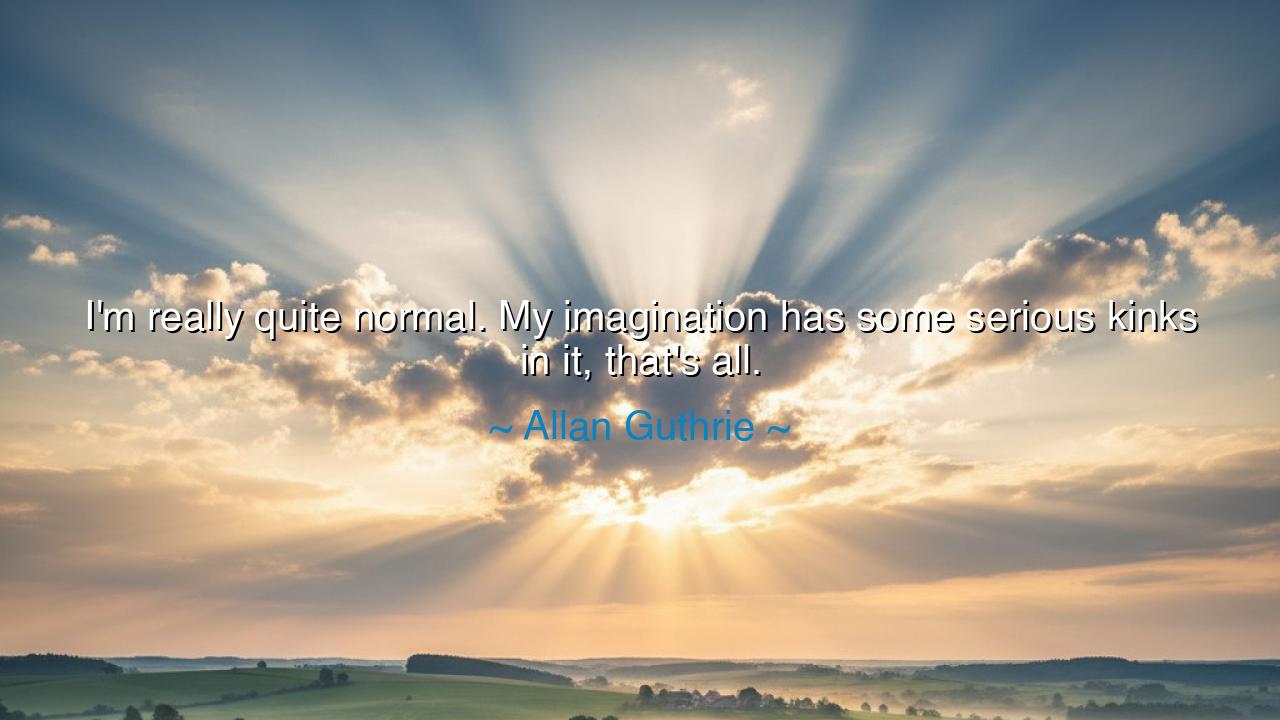
I'm really quite normal. My imagination has some serious kinks in






“I’m really quite normal. My imagination has some serious kinks in it, that’s all.” – Allan Guthrie
At first glance, this declaration by Allan Guthrie, the Scottish novelist known for his darkly comic and often unsettling crime fiction, seems a jest — a playful shrug from a writer defending his strange stories. Yet beneath its humor lies a deep and enduring truth about the dual nature of the human mind. For Guthrie, like all artists, speaks of the imagination not as a tame servant of reason, but as a wild and untamed creature — unpredictable, unruly, and alive with its own desires. When he calls himself “quite normal,” he draws a line between the world of appearance and the world within. Outwardly, he walks among others as any man might; inwardly, he travels through labyrinths of shadow and wonder.
This is the ancient paradox of the creative spirit. The poet, the painter, the dreamer — each may seem ordinary to the eye, yet they dwell in invisible realms where the boundaries of reality tremble. To have an imagination with “serious kinks” is not to be broken, but to be gifted with a vision that sees the world’s hidden shapes. For the mind that can twist, bend, and remake what it sees is the same mind that gives birth to art, to invention, to change. The ancients would have called this the mark of the muse, or the touch of the divine madness — that sacred disturbance which awakens the soul from sleep and drives it to create.
There is both danger and glory in this power. Many who have wielded it have been misunderstood, even feared. Consider Edgar Allan Poe, who, though polite and gentle in manner, harbored within him a storm of haunting imagery — ravens, tombs, and whispered horrors that would chill the blood of generations. The world might have called him strange, even cursed, but it was precisely those “kinks” in his imagination that allowed him to illuminate the darkness of the human condition. His stories remind us that what society calls abnormal is often the very source of its deepest insight. Without such minds, the world would be a dimmer, flatter place, stripped of its mystery and reflection.
Yet Guthrie’s humor saves his truth from solemnity. He does not claim suffering or madness; instead, he embraces his eccentric imagination with self-awareness and even pride. This balance — between normalcy and wildness — is the hallmark of wisdom. The true creator does not let imagination consume him; he guides it, as one would a spirited horse, allowing it to gallop but not to destroy. Guthrie’s words remind us that to live fully is not to deny one’s strangeness, but to weave it harmoniously into one’s ordinary life. The world may call such minds peculiar, yet they are the quiet architects of culture and meaning.
In the deeper sense, his quote also reflects a universal human truth: that within every person lies a hidden imagination, shaped by both beauty and darkness. We are all “normal” by the measure of our daily lives — eating, working, speaking — yet within us dwell secret worlds of thought, fantasy, and fear. To pretend that these inner worlds do not exist is to deny our humanity. The healthiest soul is not the one without strangeness, but the one that accepts and channels it. What Guthrie calls “kinks” are in truth the unique twists of personality and perception that make each life a work of art.
History offers us countless examples of those who embraced their peculiar visions to the benefit of humankind. Nikola Tesla, who dreamed of invisible energies dancing through the air, was dismissed by many as mad. Yet his “kinked imagination” lit the modern world. Frida Kahlo, whose paintings fused pain and passion, transformed her suffering into radiant color and symbolic fire. Like Guthrie, they stood at the edge of what was called “normal” — and from that edge, they saw further than most. Their stories teach that imagination’s strangeness is not a flaw to be cured, but a force to be honored.
And so, let the listener learn this: do not fear the wild corners of your imagination. Do not seek to flatten its edges or polish away its peculiar light. Instead, understand it, guide it, and let it speak through your chosen craft — be it art, thought, kindness, or invention. The world does not need more normality; it needs more honesty, more imagination, more souls brave enough to admit that their minds do not walk in straight lines. For in those bends, those “serious kinks,” lies the sacred fingerprint of individuality — the spark of creation itself.
Thus Allan Guthrie’s jest becomes an ancient truth: normality is the mask, imagination the heart. To live fully is to walk in both worlds — steady in life, yet untamed in thought. Embrace your peculiar mind, for it is there that the extraordinary hides, waiting to be born into the world.






AAdministratorAdministrator
Welcome, honored guests. Please leave a comment, we will respond soon